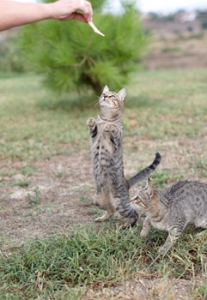The problems with feeding a cat that isn’t yours
 Feeding a cat that is not yours, may not be doing the right thing
Feeding a cat that is not yours, may not be doing the right thing
Cat owner or cat lover, we are all fond of cats. We appreciate it when they are around, we want to please them and make them happy. And what’s better for this purpose than a nice bit of food? But for several reasons, leaving cat food outside your house or feeding the nice cat that is coming to visit is perhaps not as good an idea as it may initially seem.
First, if the cat belongs to someone else, it might eat less at home. This may be interpreted as a loss of appetite by the owner, who then takes the cat to the veterinarian to have it checked over, causing unnecessary stress for both owner and cat. There are also the not inconsiderable financial consequences for the owner, as the vet may do tests because there is nothing obvious to explain this apparent loss of appetite. If the cat doesn’t eat less, then there is obviously the risk of obesity as the cat eats more than it needs and starts to put on weight. This not only puts a stress on the heart and the like, but also on the joints, resulting in painful arthritis sooner or later.
Second, if it’s not your cat, you won’t know if it has a health condition that is being controlled with a special diet. For example the cat could have a dietary sensitivity or diabetes, (which might be linked to obesity) and need to be on a specific diet to avoid problems. Feeding a routine food, may not have an obvious immediate effect, and the cat won’t avoid what might be tastier, just because it isn’t good for it in the long run. Such a choice could result in delayed complications, such as diarrhoea or a more serious crisis in the case of a condition like diabetes.
Some people like to offer visiting cats raw meat as a treat, after all, cats are strict carnivores, and feeding them with raw meat seems only natural.

Unfortunately, raw meat can carry disease, such as toxoplasmosis. This can be very serious, or may not appear to affect the cat very much (see Toxoplasmosis page here), but the cat can spread it to people including children, where the consequences can be much more serious. Feeding a cat that is not yours might not be the right thing to do, but feeding it raw meat is certainly not the right thing to do.
Finally, another sad potential consequence of feeding is that you may encourage cats to cross roads in order to come to visit and inadvertently increase the risk of them being run over. There are over 300 000 cats killed on the roads in UK each year and we don’t always know why they felt the need to cross this particular road. Getting food seems a pretty good reason, after all, many cats cross roads to head for fields where they can hunt.

So, what should we do about cats wandering in the neighbourhood? You should decide to do one or two things: First you should not feed any cat, and so avoid any problems linked to feeding them; next you can try to identify if the cats are owned or cared for? Where do they come from? Do they have to cross any road to come and see you? If they are owned, are they in good health and body condition? All this information and strong community contacts may give you the answers you need to make the right decision, and if it is not-owned, then it is better to take it to a rescue centre, where it can be fully cared for. Cat owners can also take measures to ensure that their cats are not put in “feeding- danger”. If they are on a strict diet, they can put a collar with the message “do not feed” on their cat. They can also talk to the neighbours and warn them about their cat’s special needs. Alternatively, if it is felt that it is better to keep it indoors, it must have plenty of stimulation and places to explore, so it doesn’t get frustrated.

By Dr Naima Kasbaoui and Prof Daniel Mills
University of Lincoln, Animal Behaviour Cognition & Welfare Group.




